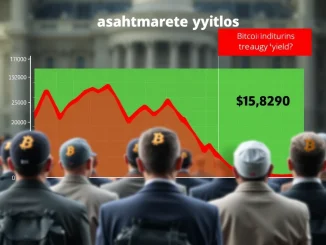
In the ever-evolving world of finance and investment, finding reliable hedges against inflation is a constant pursuit. While gold has historically held this mantle, recent performance data suggests a new contender is emerging: Bitcoin. Could Bitcoin truly be the superior Bitcoin inflation hedge?
Bitcoin’s Astonishing Growth: A Leading Inflation Hedge?
According to insights shared by economic news account Walter Bloomberg on X, Elliot Johnson, CEO of Bitcoin Treasury Corporation, makes a compelling case for Bitcoin’s role as an inflation hedge. Johnson highlights Bitcoin’s remarkable performance compared to traditional assets and fiat currency.
Over the past five years, Bitcoin (BTC) has delivered extraordinary returns, significantly outpacing other major asset classes often considered inflation hedges. This period has also seen substantial inflation, particularly impacting the value of the U.S. dollar.
Here’s a look at the performance comparison cited:
- Bitcoin (BTC): Approximately 1,000% growth
- Gold: Approximately 92.5% return
- U.S. Dollar: Lost over 20% of its value due to inflation
This data presents a clear picture: in a period marked by significant currency devaluation, Bitcoin’s price appreciation has far exceeded that of gold, traditionally the go-to asset for preserving purchasing power.
Comparing Bitcoin vs Gold: The Data Speaks Volumes
The direct Bitcoin vs gold comparison over this specific five-year timeframe strongly favors the digital asset. Gold’s nearly 100% return is respectable, but it pales in comparison to Bitcoin’s four-digit percentage gain. This stark difference in performance is leading many investors and analysts to reconsider which asset provides a more effective shield against rising prices.
While gold’s value is tied to its scarcity, historical acceptance, and physical properties, Bitcoin’s value proposition as an inflation hedge is often attributed to its fixed supply cap (21 million coins), decentralized nature, and increasing global adoption. Unlike fiat currencies, which can be printed in unlimited quantities by central banks, Bitcoin’s issuance schedule is predetermined and transparent, making it resistant to supply inflation.
Why is BTC Seen as a Superior Inflation Hedge?
The argument for BTC inflation hedging capability rests on several key characteristics:
- Fixed Supply: Only 21 million Bitcoin will ever exist, creating inherent scarcity similar to precious metals but enforced cryptographically.
- Decentralization: No single government or entity controls Bitcoin, making it immune to the monetary policies that devalue fiat currencies.
- Divisibility and Portability: Bitcoin can be easily divided and transferred globally, offering practical advantages over physical gold.
- Growing Network Effect: As more people use and hold Bitcoin, its network becomes stronger and potentially more valuable.
These factors combine to offer an alternative store of value that behaves very differently from traditional assets like gold or government-issued money.
Crypto Inflation Hedge: Is Bitcoin the Only Player?
While the focus here is on Bitcoin, the concept of a crypto inflation hedge extends to other digital assets as well. However, Bitcoin’s position as the largest, most established, and most secure cryptocurrency makes it the primary candidate when discussing the crypto market’s potential to act as a hedge against macroeconomic instability and inflation. Its performance data over the past decade, including recent years of high inflation, provides the strongest empirical evidence within the crypto space.
Making Sense of the Bitcoin Gold Comparison for Investors
The striking Bitcoin gold comparison presented by data like Johnson’s forces investors to evaluate their portfolios. While gold remains a valuable asset with a long history, Bitcoin offers a high-growth, digitally native alternative. Investors considering Bitcoin as an inflation hedge should also be mindful of its volatility, regulatory landscape, and the technological risks inherent in digital assets. Diversification remains a crucial strategy, and understanding the unique properties and risks of both Bitcoin and gold is essential for making informed investment decisions in an inflationary environment.
Conclusion
Elliot Johnson’s observations, highlighting Bitcoin’s massive outperformance over gold and the U.S. dollar in recent years, underscore a significant shift in the perception of inflation hedges. While gold has served this purpose for centuries, Bitcoin’s unique characteristics and explosive growth are positioning it as a powerful, perhaps even superior, alternative in the digital age. As inflation continues to be a global concern, the debate between Bitcoin and gold as the ultimate store of value will undoubtedly continue, with recent data providing strong support for the digital challenger.



